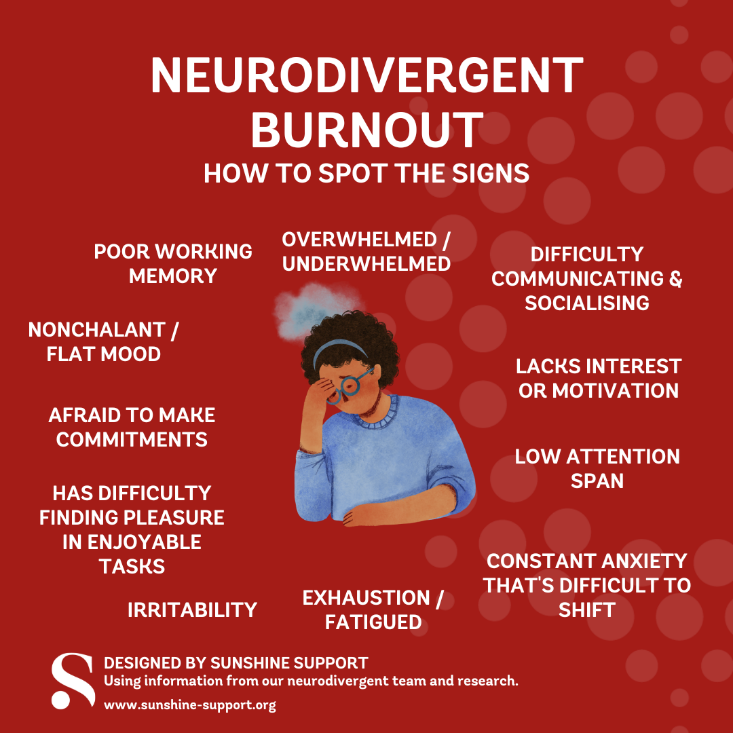Neurodivergent Burnout: Recognize and Recover
By Chelsea Bernard (BSW)
Working daily with people in the arts and entertainment industry, I see firsthand how widespread burnout is – it’s a major topic for our communities. As a neurodivergent adult, I want to share my personal perspective on what burnout can look like for neurodivergent folks, along with some tips and tricks I use to prevent and recover from it.
Katie Rose Guest Pryal, author of Burnout and Diversity for Psychology Today, says: “Neurodivergent people are particularly susceptible to burnout. We are already operating in a world that is not built for our brains. Add in overwork and unreasonable expectations at work or home, and you have a recipe for burnout.”
Burnout can manifest differently in neurodivergent folks compared to those who are neurotypical. Because neurodivergent brains process information, stimuli, and stressors in unique ways, the signs of burnout may not always align with conventional expectations. Recognizing and addressing neurodivergent burnout early is crucial for prevention and long-term well-being.
Recognizing the Signs of Neurodivergent Burnout
Burnout among neurodivergent people often presents as a complex combination of physical, emotional, and cognitive symptoms, including chronic fatigue, anxiety, stress, irritability, increased meltdowns, avoidance, loss of speech, headaches, feeling overwhelmed, a feeling of unease or impending danger, loss of skills, shutting down, difficulty with executive functions, heightened sensory sensitivities, emotional dysregulation, suicidal thoughts, and physical health issues.
A key contributor to burnout in neurodivergent folks is masking – a common neurodivergent coping mechanism of suppressing natural behaviours to fit in during social situations. While masking can help navigate social and professional spaces, doing so for long periods of time can cause an overwhelming sense of physical and mental exhaustion, often contributing to burnout.

Preventing Neurodivergent Burnout: Nine Ideas to Explore
1. Recognize the signs of burnout early on
Becoming familiar with your personal burnout symptoms early on will allow you to act proactively before burnout becomes debilitating.
2. Limit screen time to concentrate on meditative practices
Excessive screen use – especially exposure to social media – can contribute to sensory overload. Taking regular breaks to limit screen time and focus on the here and now can help regulate the nervous system. Try incorporating grounding activities, such as deep breathing, mindfulness, meditation, or spending time in nature in your breaks.
3. Prioritize sleep and nutrition
Establishing consistent sleep routines and consuming healthy food will ensure that your body is better equipped to handle stress and prevent burnout. Applications that track your nutrition and sleep patterns can help create routine and diligence.
4. Unmask: tend to your sensory and unmasked needs
It is important to express and explore our non-masked identities to allow ourselves to simply be who we are without personal or societal expectations. Spend as much time alone as you need to explore your own identity without perception from others. Surround yourself with like-minded, understanding people who support and encourage you to unmask, and practice self-compassion when in new and uncomfortable environments.
5. Connect with other neurodivergent folks
Finding and building relationships with others with similar experiences and other neurodivergent folks can create community, understanding, and support and help reduce isolation and stress. Find nearby organizations that centre neurodivergent experiences. Society for Neurodivergency (S4Nd) offers peer support groups that are run for and by neurodivergent individuals.
6. Find a level of balance that works for you and set boundaries
Establishing clear boundaries around work, social commitments, and sensory limits helps prevent overexertion. Communicate these boundaries to those around you to maintain a sustainable balance. Check out this video from a neurodivergent Youtube creator that discusses some strategies that can be helpful when setting boundaries.
7. Lower self-expectations
Due to neurodivergent discrimination, social expectations to be neurotypical can be overwhelming and personal. It is important that we recognize that our brains function differently and that it is not a flaw. This can help reduce self-criticism and lower the expectations that we place on ourselves to act neurotypical.
8. Practice self-compassion
Remember – burnout is not a personal failing. It is a result of institutional (workplace, home, social, cultural) barriers and expectations, and there are things we can do to mitigate and prevent burnout. Acknowledge your challenges with kindness and advocate for accommodations when needed. Reach out to organizations and groups that provide information and resources that can help you with advocating, such as Centre for ADHD Awareness or Neurodiversity Change Network.
9. Seek professional support
Talking to a doctor or a healthcare professional can provide support with managing mental and physical symptoms of burnout and help create personalized coping strategies. It is important to remember that there is no shame in reaching out for help when it comes to our personal well-being.